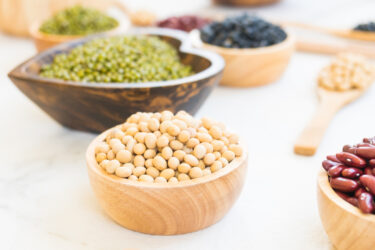11 Ways To Treat Thyroid At Home
By Dr. Nikita Toshi +2 more

Get,

to manage your symptom
Get your,


4 Cr+ families
benefitted

OTP sent to 9988776655



You’ve successfully subscribed to receive
doctor-approved tips on
Whatsapp

Get ready to feel your best.

Hi There,



Register to Avail the Offer
Send OTPBy continuing, you agree with our Privacy Policy and Terms and Conditions

Hi There,

Trusted by 4 crore+ families

OTP sent to 9988776655



You have unlocked 25% off on medicines




Code: NU25




By Dr. Nikita Toshi +2 more
Table of Contents
The butterfly-shaped thyroid gland controls most of the metabolic processes of the body. Thermoregulation, hormonal function, and weight management are just some of the important functions of this gland.

Those who suffer from thyroid problems can look at home remedies to deal with the issue more comprehensively.
Before we get into home remedies we need to cover the basic differences between hyperthyroidism and hypothyroidism based on their symptoms:
| Hypothyroidism | Hyperthyroidism |
| Feeling tired | Feeling tired |
| Hair Loss | Hair Loss |
| Increased weight | Sudden weight gain or loss |
| Trouble sleeping | Trouble sleeping |
| Sensitivity to cold | Sensitivity to heat |
| Constipation | Diarrhoea |
| Sweating less | Sweating more |
| Decreased heart rate | Fast and irregular heart rate |
| Brittle, easily chipped nails | Thickened, flaky nails |
| Depression, easily irritable | Anxiety |
| Puffy face | Puffy eyes |
| Joint and muscle pains | Muscle weakness |
| Feeling sluggish or slow |
Based on these differences you may get an idea of which form of thyroid issue you have but always check with your doctor who will recommend a thyroid test for a clear diagnosis.
Did you know?

Coconut oil has medium-chain fatty acids that help in better functioning of the thyroid gland. Coconut oil, specifically when taken in a non-heated form, helps lose weight, increases metabolism and balances body temperature.
Unlike other types of oils, coconut oil has a high content of saturated fat (healthy). With the right combination of exercise and a properly balanced diet, coconut oil could be good for thyroid glands.

Apple cider vinegar helps in the balanced production and expression of hormones. It improves metabolism and helps to alkalize the body environment.
Apple cider vinegar helps regulate body fats, wash away toxins from the body, and absorption of nutrients. Apple cider vinegar can be added to water along with honey and can be taken every morning,

This is one of the easiest home remedies for thyroid as it is easily available. Ginger is rich in essential minerals like potassium and magnesium and helps combat inflammation, one of the primary causes of thyroid issues. It is easiest to have ginger tea.
It can also be used as an essential oil. If ginger is mixed with a carrier oil (coconut oil, for example) it can be applied to the body. Ginger oil can also be used via essential oil diffusers.

Vitamins help to fight the underlying causes of thyroid problems. Vitamins from the ‘B’ family are essential for proper thyroid function. Vitamin B12 is especially instrumental in helping people with hypothyroidism. Including eggs, meat, fish, legumes, milk, and nut in daily diet might help with a steady supply of Vitamin B.
Since the diet may not be able to meet the daily requirements, taking supplements will help.

The deficiency of vitamin D can lead to thyroid problems. Since the body can produce it only when exposed to the sun, ensure that you get a minimum of 15 minutes of sunlight daily. This will also lead to better calcium absorption and good immunity.
Some foods that are rich in Vitamin D are fatty fishes like salmon and mackerel, dairy products, orange juice, and egg yolks. If Vitamin D levels in the body are very low, supplements will be necessary. However, one must be cautious and consult with a doctor about dosage because too much vitamin in the body can be harmful.
Also Read: 8 Most Effective Foods To Fight Thyroid!

Most nuts are beneficial to the body in some way or the other. Almonds are best suited for proper thyroid expression. They are a good source of protein, fibre, and minerals.
Almonds have selenium which is a thyroid healthy nutrient. It is also very rich in magnesium that can keep the thyroid gland working very smoothly.

Milk, cheese, and yoghurt are very beneficial for the thyroid as they are high in iodine, the mineral that is essential for proper thyroid functioning. Consuming dairy products will also help with increasing vitamin levels which in turn will help with thyroid problems.

Beans are a powerhouse of nutrition. They are rich in fibre, protein, essential minerals and vitamins. Beans are rich in antioxidants and complex carbohydrates. Since beans are also very high in fibre, it helps with constipation which is a common side effect of hypothyroidism.

Another thing that works in improper thyroid functioning is taking iodine supplements. This becomes more important for those who are vegetarians. These supplements restore the balance of iodine in the body and help with thyroid health.

Seaweed is a type of very large algae that grow in saltwater and marshes, it typically contains high to very high concentrations of iodine. Iodine is an essential mineral required by the pituitary gland for the formation of thyroid hormones.
However, please note, for both seaweed and iodine supplements – excessive amounts of iodine may itself result in poor thyroid function and goitre, please check with your doctor before trying either of these out.

Seaweed is a type of very large algae that grow in saltwater and marshes, it typically contains high to very high concentrations of iodine. Iodine is an essential mineral required by the pituitary gland for the formation of thyroid hormones.
However, please note, for both seaweed and iodine supplements – excessive amounts of iodine may itself result in poor thyroid function and goitre, please check with your doctor before trying either of these out.
Discipline and focus is the key to good thyroid health.
People suffering from hypothyroidism should avoid excessive consumption of cruciferous vegetables(cabbage, broccoli) and soy products, these foods contain goitrogens which might interfere with the production of thyroxine hormone.
Dr. Nikhil Yadav, MBBS MD, CCEBDM
Also Read: Foods to Avoid in the Case of Hypothyroidism: A Research-Based Approach
Over time, if hypothyroidism is left untreated, it can cause a number of health problems, such as obesity, joint pain, infertility and heart disease.
Weight gain or difficulty losing weight, constipation, dry skin, hair thinning, fatigue, enlarged thyroid and hoarse feeling in your throat are some of the major warning signs for thyroid.
If you have a thyroid problem that is not treated in time, serious health complications can arise. An overactive thyroid (hyperthyroidism) can lead to a number of problems including eye problems, such as bulging eyes, blurred or double vision or even vision loss in the future.
Testing for thyroid function typically does not require fasting. Thyroid blood tests, such as TSH, T3, and T4, can usually be done at any time of the day without the need for fasting. However, it is always best to follow your healthcare provider’s specific instructions.
Yes, thyroid disorders can cause headaches. Hypothyroidism and hyperthyroidism can both contribute to headache symptoms due to hormonal imbalances and their effects on the body’s systems. Proper management of thyroid conditions can help alleviate headache symptoms.
Yes, thyroid disorders can affect menstrual periods. Hypothyroidism (underactive thyroid) and hyperthyroidism (overactive thyroid) can cause irregular menstrual cycles, heavier or lighter periods, and changes in cycle length due to hormonal imbalances. Proper treatment of thyroid conditions can help regulate menstrual cycles.
Yes, thyroid disorders can affect pregnancy. Both hypothyroidism and hyperthyroidism can impact fertility, pregnancy outcomes, and fetal development. Proper management and monitoring of thyroid levels are crucial for a healthy pregnancy.
Yes, hyperthyroidism (an overactive thyroid) can cause weight loss due to an increased metabolic rate, leading the body to burn calories faster than usual. Conversely, hypothyroidism (an underactive thyroid) typically causes weight gain.
Yes, thyroid disorders can cause hair loss. Both hypothyroidism and hyperthyroidism can disrupt the normal hair growth cycle, leading to thinning hair or hair loss. Proper treatment of the thyroid condition often helps restore normal hair growth.
Yes, alcohol can affect thyroid function. Chronic alcohol consumption may interfere with thyroid hormone production and metabolism, potentially leading to thyroid dysfunction. It can also affect the gland’s ability to produce hormones, impacting overall thyroid health.
Thyroid disorders can often be managed effectively, but permanent cures are rare. Hypothyroidism and hyperthyroidism typically require lifelong treatment to control hormone levels. However, certain conditions like thyroiditis may resolve on their own, and surgical options can provide a long-term solution for some thyroid issues.
Yes, thyroid patients can donate blood if their condition is well-managed and they meet all other eligibility criteria. It is important to ensure their thyroid levels are stable and they are not experiencing symptoms that could affect their ability to donate safely. Always check with the blood donation center for specific guidelines.
Yes, thyroid disorders can have a genetic component. Family history of thyroid conditions increases the likelihood of developing thyroid issues, suggesting a hereditary link. However, environmental factors and lifestyle choices also play significant roles in the development of thyroid diseases.
No, thyroid disorders are not contagious. They are medical conditions that result from various factors such as genetics, autoimmune issues, or environmental influences. Thyroid disorders cannot be transmitted from person to person like contagious diseases.
Read More: 8 Best Foods for Thyroid to Include in Your Diet
Disclaimer: The information provided here is for educational/awareness purposes only and is not intended to be a substitute for medical treatment by a healthcare professional and should not be relied upon to diagnose or treat any medical condition. The reader should consult a registered medical practitioner to determine the appropriateness of the information and before consuming any medication. PharmEasy does not provide any guarantee or warranty (express or implied) regarding the accuracy, adequacy, completeness, legality, reliability or usefulness of the information; and disclaims any liability arising thereof.
Links and product recommendations in the information provided here are advertisements of third-party products available on the website. PharmEasy does not make any representation on the accuracy or suitability of such products/services. Advertisements do not influence the editorial decisions or content. The information in this blog is subject to change without notice. The authors and administrators reserve the right to modify, add, or remove content without notification. It is your responsibility to review this disclaimer regularly for any changes.

Leave your comment...

View all comments(6)
Good day!
Thank you for this information.
Thank you, glad you liked it.
Thank you. This is a great information for those who are suffering from Thyroid problems.
You are welcome. We appreciate your support, stay tuned for more such articles.
Thank you for all this helpful information.
You are most welcome. Hope you found it useful.